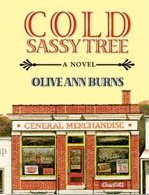Will Tweedy is a 14-year-old in a small town in Georgia in 1906. He relates the story, inasmuch as he understands (and much of which he learns by spying and eavesdropping), of his grandmother’s death, his grandfather’s hasty remarriage, and the resulting uproar. Unfortunately, it is a story that failed to rouse my interest. A year ago, I checked it out from the library, read the first 10 pages, and found it overburdened with hysteria and provincialism. So I returned it. Recently I borrowed the recorded book to give it a second chance. The excellent reader, Tom Parker, had much to do with my slogging through to the end.
There were a lot of things I didn’t like about the book, but the core problem was that I couldn’t manage to like or care about a single main character. It seemed that everyone was a) very selfish, b) hysterically concerned with other people’s opinions, or c) an incurably judgmental gossip. Several characters, especially Will Tweedy, spent considerable amounts of time and effort in scheming about how to humiliate, hurt, or avenge themselves on other people. Women’s bodies and their societal and familial roles were often mocked or made the object of demeaning practical jokes. Christian theology and practice were depicted as mere formal customs that functioned generally as a way to exclude, embarrass, or control others.
Olive Ann Burns’ writing is quite good, and her Southern flair is flawless. Doubtless every small Southern town in the early 20th century had its share of selfish storekeepers, melodramatic women, and mischievous boys, and as a chronicle of such persons, this book excels. However, it is neither a pleasant nor an edifying read.
| Title: | Cold Sassy Tree |
|---|---|
| Author: | Olive Ann Burns |
| Date published: | 1984 |
| Genre: | Fiction |
| Number of pages: | 400 |
| Notes: | Listened to Recorded Book read by Tom Parker |



0 comments:
Post a Comment